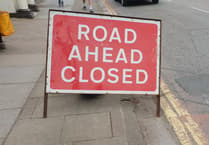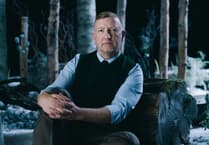FOLLOWING a month of filming in and around the local area, the crew and cast behind the forthcoming movie based on Owen Sheers' acclaimed novel 'Resistance', shot their final scenes on the weekend.
Prior to the final 'wrap' Abergavenny Chronicle reporter TIM BUTTERS was invited on set for an exclusive insight into the making of this second world war drama with a difference and an opportunity to have a chat with the producer, director, and of course, the writer behind the film which asks the tricky question what would have happened if the Germans had won the war?
I am standing stock still in a cold deserted farmhouse alongside fellow Chronicle reporter Hannah Mlatem and a huddle of wary strangers, who from time to time bid me with over-exaggerated and paranoid gestures to be both silent and still, as the cold November rain beats a rhythm of mockery on dirty windowpanes that lead to the outside world and freedom.
The air grows thick and stifling with tension as a consequence of the heavily armed and battle-hardened German soldiers arguing passionately about life and death issues in the room next door.
Teutonic tones rise and fall in heated debate amongst men no strangers to slaughter and suffering, and as each drawn-out second of each stifling minute seems to stretch into eternities without end I finally I sigh to myself, "Well, this is quite a surreal way to spend a Wednesday afternoon."
Yet as I discovered upon visiting the Elizabethan character and charm of Chapel Farmhouse situated on the stately grounds of Clytha House, where scenes from the film Resistance were being shot, film-making is a surreal business.
Especially when the film in question is set in an alternative history where the D-Day landings in Normandy have been repelled and the German army have invaded Britain in a story which the writer Owen Sheers has described as "Retrospective science fiction."
Idly gazing at the rolling fields which surround the stately splendour of Clytha House, whilst being chauffeured to the film location by my driver 'Mlatem', it is not impossible for one to imagine breathing in the air of a bygone era.
However, any illusory daydreams of a more distant and refined age are soon shattered when a red-faced man with a walkie-talkie comes frantically storming down the lane towards us making manic hand gestures for Mlatem to kill her engine. An engine which motors along like a bad-tempered lorry at the best of times.
For the next 15 minutes we sit akin to clueless and dumbstruck monkeys in Mlatem's car as the man holds up his hand to still our curious tongues every time we try to engage in any entreaties for an explanation.
It finally transpires that our arrival on a movie set failed to get off to the most auspicious of starts, as the all-pervasive noise caused by Mlatem's internal and infernal combustion engine had encroached like a clumsy but well-meaning elephant onto a scene the director was in the process of shooting.
A scene as it turned out, which required a hushed and stilled atmosphere of delicacy and a deft lightness of touch.
All's well that ends well though and after finally setting foot on set and causing the director Amit Gupta further dismay by getting in the way of the cameras, one of the film's producers Richard Holmes (Eden Lake, Walking Ned) takes us into an adjacent room and in between takes kindly answers all our questions.
In a nutshell, Resistance tells the tale of Sarah Lewis (played by BAFTA-nominated Andrea Riseborough), a 26-year old farmer's wife, who wakes one day to find her husband Tommy Atkins (Michael Sheen) has disappeared.
She is not alone. All the other women in the isolated Welsh border valley of Olchon have also found their husbands have disappeared - in all likelihood to join the British resistance.
The women regroup as an isolated, all-female community and wait, hoping for news.
Then, a German patrol mysteriously arrives in the valley and when a severe winter forces the two groups into co-operation, a fragile mutual dependency develops and Sarah begins a faltering acquaintance with the patrol's commanding officer, Albrecht Wolfram (Tom Wlaschia).
But as the pressure of the war beyond presses in on them, the valley's delicate state of harmony is increasingly threatened, before being broken completely, with devastating consequences.
"After reading Resistance I was still thinking about it for days later and what a great film it would make," revealed Richard when asked about his initial involvement in the project.
"The next step was getting the money together and fortunately we had enthusiastic responses from a Munich-based distributor, Film Agency Wales and, I am delighted to say, local private investment."
Although it was pouring down with wild Welsh rain on the day, Richard said, "We've been very lucky with the weather. Whenever we're filming outdoors we've usually been blessed with brilliant sunshine and on days such as this when we're filming indoors, the rain doesn't matter."
Utilising a large part of the local area to shoot the film in its entirety, from the Brecon Beacons to the Hereford border, Richard explained, "Because we're filming in the same environment the book was set in, the breathtaking scenery plays a very visual part in the telling of the story."
After showing us around the rest of a quaint Welsh farmhouse filled with grenades, guns, military uniforms and artifacts from times gone by, Richard introduces us to the film's director Amit Gupta, who is making his feature film debut at the helm of Resistance and said, "Although it has been very challenging, I've loved every minute of both filming and being in this part of the county. In fact, I don't want to go home.
Amit added, "We all went out to experience the delights of a Saturday night in Abergavenny recently, and the best thing was I brought a round of drinks that would've cost me £200 or £300 in London but here it only cost me about £40.
"I have been making a film in between the drinking sessions though," joked the director.
Of course, we couldn't leave without having a word with the man responsible for this hive of activity in the first place, and as the light was fading and the last scene of the day was about to be shot, Owen Sheers arrives on set in what he bafflingly refers to as his 'hairdresser's car', before we accost him in the mud and drizzle outside the farmhouse, demanding that he explain himself.
"All this is still quite overwhelming to me," explains Owen, whilst motioning with one hand to the surrounding paraphernalia that goes into making a movie.
"When I was writing Resistance, I never imagined it would end up on the screen. I think if you write with that in mind you'll write a bad novel, but I must say I'm very excited to see the finished film and I've made a conscious decision not to watch any of the rushes."
The first seeds of the film adaptation of Resistance were sown when Amit visited Owen (pictured together below) in New York and Owen gave his director friend a copy of the book to read.
"Amit loved the book and though it had great cinematic possibilities, so we sat down and wrote a script together. Which was great because it was like having a second chance at writing a novel and seeing how I could improve it," explained Owen.
"I thought I would have been more precious with the book but I was surprised at just how rigorous I was in the process of turning it into a film script."
When the producers finally came on board, Owen was keen to lay down a few ground rules. "Firstly, it had to be filmed in this area, and secondly the scenes where the Germans were speaking with one another had to be in German for it to be believable because occupation reveals itself in linguistics as much as any other form," added Owen.
Since filming began, Owen has had nothing but praise for the crew and cast who have turned the translation of his work from the page to the screen into a labour of love.
"I love writing, but it can be a lonely business," admitted Owen, "What has been so nice about being involved in this project is the opportunity to be part of a team.
"Richard the producer has been lovely and realised straightaway how important it was that the film was filmed only in this area.
"The crew is a small one but they are a hearty bunch and waste no time in getting things done. As for the actors, I am in complete awe of how they have raised their game continually since filming began."
"Most of all though," added Owen, "The whole film has benefitted from the goodwill of the locals.
"We would not have got that if we had filmed in other areas. For example on our big 'extras' day the whole scenes seemed to be full of people I knew from school. It was very much a case of 'Look there's my old RE teacher on a horse,' which was really fantastic.
"Also I would like to stress how we have had a lot of financial support from local investors, and I hope for them and everyone else, when it finally comes out next year, this film exceeds all expectations."




Comments
This article has no comments yet. Be the first to leave a comment.